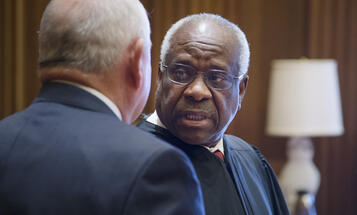
Half a Step Forward and a Full Step Back: Can Connecticut Maintain its Leadership on Money in Politics?
The Democrat-controlled state legislature just weakened this landmark law, Connecticut’s “Citizens’ Election Program."
I called Connecticut home for three years between late 2003 and early 2007. During my time there I was first dismayed to learn of the scandal and malfeasance associated with then-Governor John Rowland’s administration, and then thrilled when in late 2005 the state legislature responded by passing one of the nation’s strongest laws to reduce the influence of big money in politics.
Unfortunately, the Democrat-controlled state legislature just weakened this landmark law.
Connecticut’s “Citizens’ Election Program” provides public grants to candidates who demonstrate their seriousness and viability by raising a threshold number of small contributions from constituents they seek to represent.
The point of the law is to help citizens run for office without depending upon a small number of wealthy donors and special interests to fund their campaigns—as is unfortunately the case at the federal level. (Connecticut’s junior U.S. Senator Chris Murphy recently described what it’s like to run for office in our federal big money system at a conference at Yale. Hint: it’s “soul-crushing.”)
Connecticut’s law has worked—leading to better policy, better governance, and a better experience for candidates, as my Demos colleague J. Mijin Cha documented in this April 2013 report.
But, earlier this week, the Connecticut legislature cracked open the door for big money in the state.
Democratic leaders say they are changing the law to account for the times. Since 2005, two decisions by the Roberts Court’s conservative majority have changed the landscape. Citizens United ushered in a new era of outside spending, leaving candidates for public office vulnerable to million-dollar assaults from Super PACs and tax exempt non-profits. And, a lesser-known case called Arizona Free Enterprise Club’s Freedom Club PAC v. Bennett limited public financing programs’ ability to deal with this outside assault by (somewhat preposterously) declaring that providing candidates with extra public funds to respond to outside attacks (often called “fair fight funds”) somehow violates the free speech of the big spenders.
Connecticut’s lawmakers have one point right—times are different and we should update our campaign finance rules to account for new conditions (even when those conditions were imposed by an out-of-touch Court mangling the First Amendment).
In fact, advocates on the ground like Common Cause/CT had been supporting a package the included strong disclosure requirements for outside spenders and updated coordination rules that would prevent candidates from getting too cozy with special interests who help them win office by funding so-called “independent expenditures.”
But, unfortunately, the measure passed by the House and Senate is a step backwards. The disclosure and coordination provisions are far weaker than they should be. Worse, the new law doubles the amount that a wealthy donor can contribute to a state party committee from $5,000 to $10,000 and to a town committee from $1,000 to $2,000. And, it reintroduces the banned practices of for-profit businesses buying advertisements in “ad books” organized by local party committees and state contractors contributing to candidates.
The point of the Citizens’ Election Program is to give ordinary citizens and not wealthy donors the power to control who runs for office and who wins elections—so that elected officials will be accountable to their voting constituents, not a separate class of “cash constituents” (or “Lesters” as Larry Lessig calls them in his compelling TED talk).
Updates to the law must be consistent with this basic principle. Increasing contribution limits from $5,000—already well beyond the reach of most people in a state with a median household income of just over $69,000—to $10,000 fails this test.
So, what should state leaders have done? They should have found ways to bring more money into the system from ordinary citizens to balance out the flood of outside spending from wealthy donors.
There are several ways they could have done that:
First, they could have eliminated the law’s existing spending limits for publicly funded candidates and allowed participating candidates to continue to raise small contributions from Connecticut residents.
Next, they could have provided a public match on those additional funds of three, four, or five to one. So, if a candidate raises $50 from a constituent, she could receive a total of $200 or even $300. (Note: larger matching ratios are appropriate for systems that use matching rather than grants as the main form of public funding.)
Next, to accommodate the small minority of truly expensive races (where candidates face big Super PAC or other outside spending), the Connecticut legislature could have provided for a second public grant with a high qualifying threshold.
For example, a candidate who can raise another 1000 $5 contributions in her district (on top of the contributions she had to raise to qualify for the program in the first place) would get an extra $200,000. These figures are just illustrative, and would be adjusted for the size of district, etc.; but the point is that a high qualifying threshold would ensure that only candidates who truly need the money are likely to undergo the effort to receive it. And, the high-profile nature of these few races would make it more likely that they would be able to cross the hurdle.
Next, legislative leaders could have added a voucher or tax credit program that would incentivize more ordinary citizens to contribute.
Congressman John Sarbanes has introduced a federal bill with an innovative “People’s Fund” to support grassroots candidates in districts in which outside spending significantly outpaces national norms.
There are surely other good ideas I haven’t captured here. The point is that the proper response to Citizens United is not to throw up our hands and say “oh, well, I guess we’ve got to fight big money with big money.” There are plenty of better ways to craft proposals that are consistent with our principles.
In 2005, Connecticut took a huge step toward building a state in which the size of a citizen’s wallet doesn’t determine the strength of her voice. Connecticut’s Democratic leadership should keep the state on that path by reversing the recent weakening of its lauded campaign finance laws.



